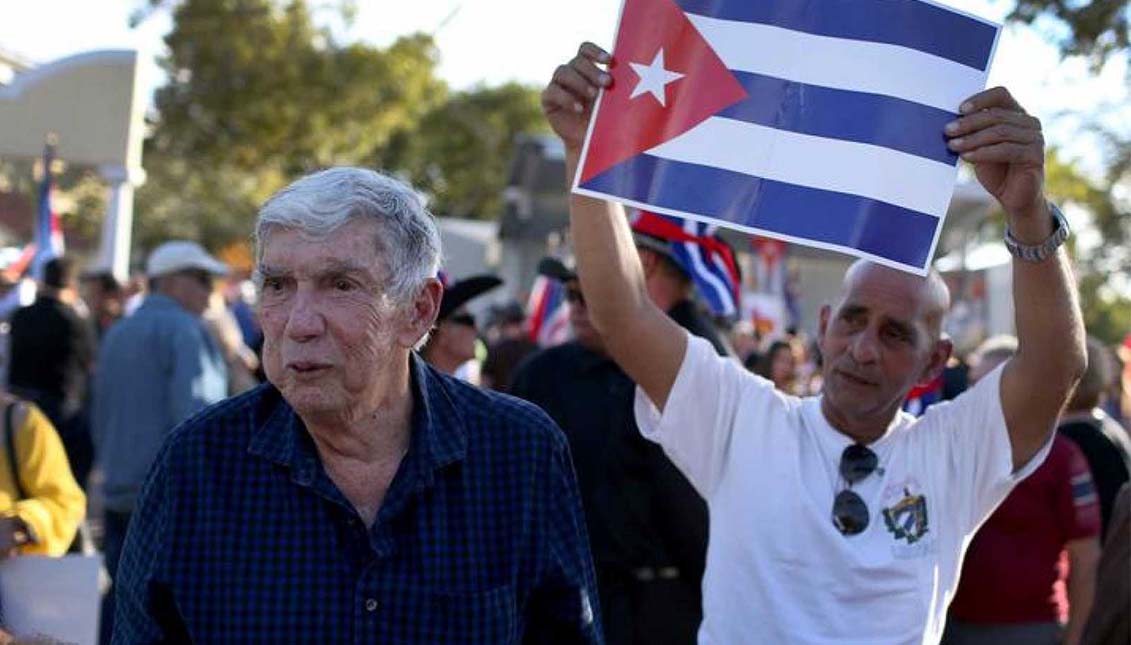
Cubans protest in Miami demanding to be reunited with their families
Two years after the Parole program was suspended under strange circumstances, the U.S. does not respond to the thousands of Cubans waiting a visa for their…
The Cuban Memorial Park in Miami became on Sunday a hotbed of shouts and protests from hundreds of Cubans demanding the continuation of the Parole Family Reunification Program that allows Cubans legally residing in the United States to apply for the admission of their families in the country.
The Parole Program was suspended in 2017 after more than half of the U.S. diplomatic personnel in Havana had to leave the embassy as a result of a strange ailment, which included symptoms of brain lesions, such as dizziness, headaches and lack of concentration, and which also attacked Canadian personnel, reporting one last case this past January.
"We want first and foremost the safety of U.S. diplomatic personnel, but we ask that the paralysis of our family reunification program be resolved, either in a third country or that the interviews be done via Skype," Gretel Moreno, one of the protest coordinators, told the Miami Herald.
And he added:
"We have sent letters to the State Department, senators and congressmen: all without response. Two years after the stoppage of most of the proceedings at the U.S. Embassy in Havana, the cases remain unprocessed.
According to Nuevo Herald, at least 20,000 families were trapped in a migration limbo when the program was suspended, and it doesn't look like it could be unblocked, even though Parole petitioners made the payments requested by the U.S. Citizenship and Immigration Service (USCIS), which plans to cancel two similar programs for Haitian and Filipino migrants.
Among the protesters of Sunday's demonstration, which were convoked by support groups on Facebook, was Maria del Carmen Nieto, a Cuban living in Miami who only aspires to be reunited with her son:
"My son has already gone to the interview. His two parents are here. We work every day to bring our son. He was studying at the university, but since he had already gone to the interview at the U.S. Embassy, he separates from the school. Since then he's in limbo: he can't study, he can't work, he's alone in Cuba," she said.
RELATED CONTENT
Her story is very similar to that of the other Cubans who raised their voices carrying T-shirts and banners with the faces of their children, siblings, and grandchildren to the stupefaction of many Miami residents, who ignored, they complained, the situation that their neighbors are still experiencing.
"We have sent letters to the State Department, senators and congressmen: all without response. Two years after the paralysis of most of the proceedings at the U.S. Embassy in Havana, the cases remain unprocessed," Gretel Moreno, coordinator of the protest.
"I am an American citizen and I support President Trump," said Erney Díaz, another of those attending the protest. "I believe in democracy, but I am very dissatisfied with the work of the congressmen. Again and again, we have written letters and sent tweets to them, but they neither listen to us nor represent us."
Diaz reminded that Cuban-Americans on the Miami-Dade Commission had rejected a resolution supporting a congressional bill that would re-establish the Family Reunification Program:
"What can we say about these people who say they represent us and despise us like that? Didn't they or their parents come from Cuba? Don't they remember what it's like to live in a dictatorship? Instead of taking the right side, they put their political interests ahead of the family," he concluded.
However, Congressman Mario Díaz-Balart blamed the Cuban government on Twitter for the situation of his compatriots:
"The regime of #Cuba failed in its obligation to protect the Americans assigned to Cuba and now the innocent Cubans are suffering the consequences."
Created in 2007, the Cuban Family Reunification Parole Program (CFRP) allows U.S. citizens and lawful permanent residents to request parole for their family members in Cuba. Once granted, family members can enter U.S. territory without having to wait for their immigrant visa cases to be processed according to assigned quotas, and get a work permit while they wait for the long-awaited legal permanent residence.











LEAVE A COMMENT: